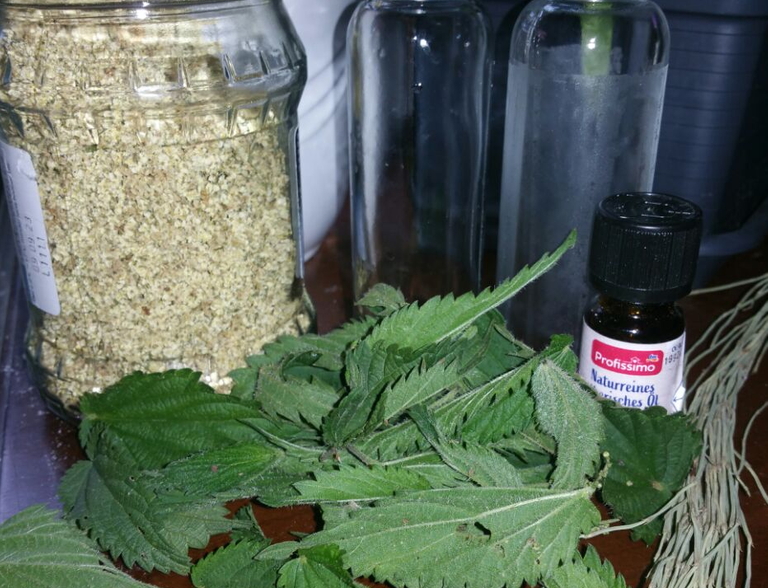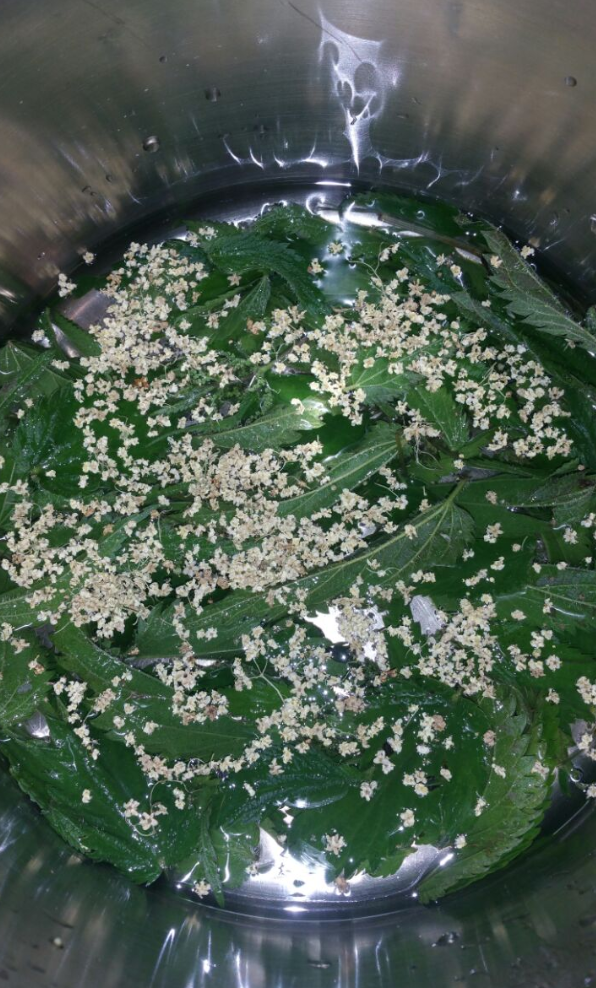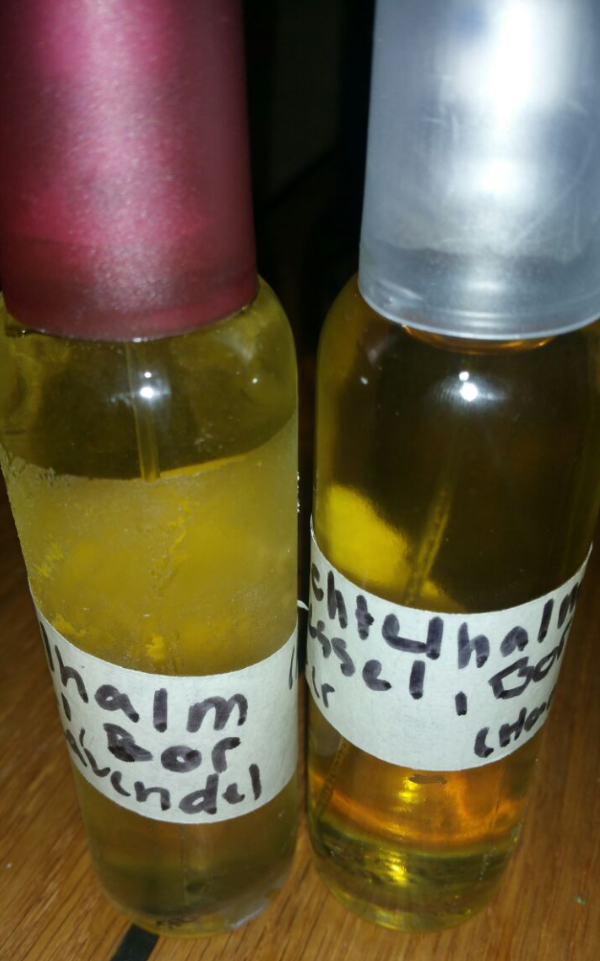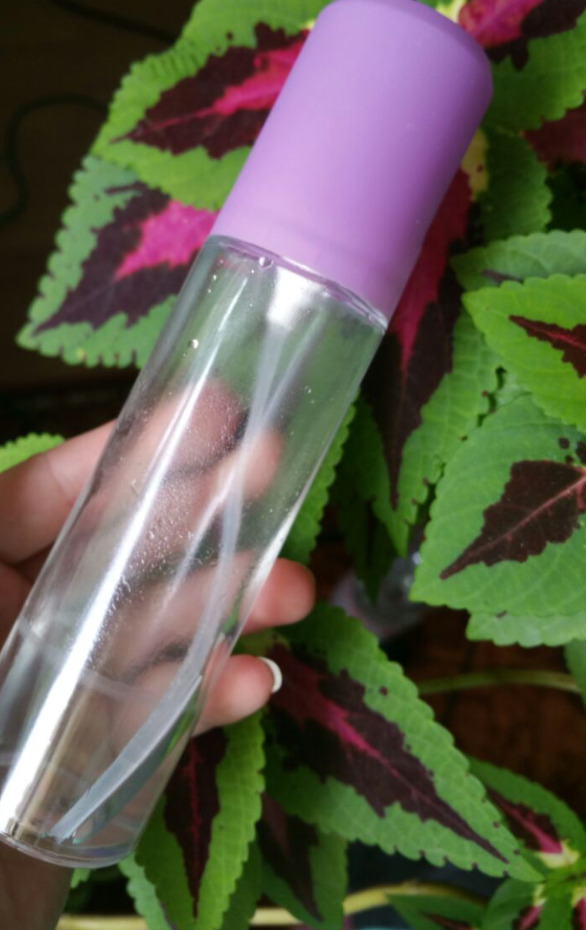Hey Hive :)
deutsch unten
EN
4 1/2 years ago I started to detoxify my hair.
This means concretely: I only smear on my skin what I can also eat.
I have used this guide.
Why is this necessary?
The shampoos contain substances, chemicals that I concretely have no idea about, so I questioned for myself what exactly I want on my scalp.
The skin in general is a great detox organ, which is directly connected to the air and environmental influences.
The head protects our brain, like sensory organs, etc. Therefore, I found it questionable to smear chemical substances on it.
Sulfates are sulfur, which makes the shampoo or hair soap to foam, so you can better massage it into the scalp. However, these substances can irritate the scalp.
However, the scalp also needs a proportion of its own sebaceous glands, i.e. fats, so that it does not dry out and become brittle. Sebaceous glands therefore secrete fats, making our skin look shiny and "greasy". This creates a protective layer around the individual hairs.
So I decided radically to simply wash my hair with no more shampoo, shower gel and bath salts and only use water.
Basically I washed only with water, but have also used a few times in between different "products":
what was relatively good for me was rye flour.
I mixed the rye flour in warm water and left it for 1 day, so that it went through a small fermentation. To this I added a splash of cider vinegar the next day. This I also let sit in the hair for 20 minutes and then washed out.
However, 4 years ago I didn't know about fermentation and the benefits of it. In addition, it was also no rye flour sourdough approach, but always freshly made.
This I have then but after mind three-quarters of a year stopped for reasons of time.
once I have industrially produced beer into the hair. The hair felt afterwards also quite ok, but the stench I did not like.
At the time I was with my experiments for others really funny :D but now after I have looked at so much knowledge about fermentation in rye, as well as beer, I understand why the such benefits are said on the Internet. Looking back, I am amazed that I came across such of all things.
Very often I have also coconut oil smeared into my hair against dryness. Among other things, I have used coconut oil many years ago once as eyebrow and eyelash treatment.
I have also dipped my hair in nettle-horsetail water so that it can soak in. However, I have noticed no differences afterwards. So it has absolutely not worsened, but improved I do not know. Maybe you have to use this herbal mixture more often.
It took a while for my scalp to calm down.... The initial period of 1 year they were over greasy, where they were then for a longer period also dry and flaky. At the back of the head, however, I continued to have a greasy spot.
Against the dryness I smeared then a Aloe creme on it, so that the skin does not tear off completely.
Of course, I also questioned why I still try something like that, if it can only temporarily relieve symptoms. After all, something.
But I think today that it was probably also due to my general body condition, which has always received insufficient nutrients.
Slowly it has become better, was at least no longer as bad greasy as more than 4 years ago, but also not optimal that I feel completely well. In addition, I also had a period of total hair loss, which I noticed during the hair combing. Which is why I then also about 2 years ago stopped combing my hair so often.... This has slightly reduced the split ends.
For a short time they even regenerate and new hairs come out stretched.
Greasy they are after 5-7 days times, where I wash them then just times again.
The only thing that has changed for me is that instead of just using water, I also use milk kefir!
I have read a lot about whether milk kefir can be good for the hair.
Since it is a super homemade home product to rebuild the intestines through the microorganisms, I thought it could also be good for the skin?
So I filled a small jar and massaged into the scalp. Then so 20- 90 minutes leave to act, in between anything done in the household and then wash off completely with water.
I use it about 2-4x a month on the scalp.
So far I have had very good experiences with it when it comes to the shine of the hair. They feel soft and even grow back.
But I was also a bit skeptical, because the first few times the hair have stunk a lot. They have then a bit of a milk kefir own smell... and if you have the more often in the nose, it is already a little unpleasant.
I then sprayed lavender water against it when it bothered me too much.
In the meantime, I no longer smell it. Either I have become very accustomed to the smell or my sense of smell has changed due to the intestinal buildup or my hair has also changed so that it no longer emits so many toxins, which then stink?
So far I like the milk kefir the best, since I make it every day anyway, it's not extra work for me. It takes the least amount of resources and can be used almost anytime. Plus it washes out better than rye flour or beer ^^ and my hair is fine.
I have heard of a few other products that stimulate the scalp so that it promotes growth, such as
- Nettle water
- Field horsetail water
- Rosemary oil
Those I would like to try also... and mix with aloe, as well as lava powder, which I still have here.
Maybe I can use the milk kefir as a base for it :) should also be a base for cosmetics.
Today I have tried the following:

To do this, I emptied and cleaned 2 filled deodorant bottles.
The field horsetail I boiled in good water, so that the silicon can dissolve into the water. Then I added nettle and elderberry to the warm water. Now I wait until the water has cooled down to room temperature. then I will strain this:

I will then bottle it, add a pinch of boron to both and add a few more drops of lavender to one.
The hair tonic is ready! I am curious to see how it works.
I think I'll just spray it on my hair for now, if I ever think of it.
the result:

My lavender water for the skin as a deodorant alternative I have also renewed today:

Simply poured out, filled with new water and added lavender essential oil and a pinch of boron. Done :o!
What do you use for your hair? ;o
regards,
charlissy
!:)
DE
schon vor 4 1/2 Jahren habe ich gestartet meine Haare zu entgiften.
Das bedeutet konkret: Ich schmier mir nur auf die Haut, was ich auch essen kann.
Diesen Leitfaden habe ich genutzt.
Wozu ist das nötig?
Die Shampoos beinhalten Stoffe, Chemikalien, von denen ich konkret keine Ahnung habe, deshalb habe ich für mich hinterfragt, was ich denn genau auf meiner Kopfhaut haben möchte.
Die Haut allgemein ist ein großes Entgiftungsorgan, welches direkt mit der Luft und Umgebungseinflüssen verbunden ist.
Der Kopf schützt unser Gehirn, wie Sinnesorgane usw. Daher fand ich es fragwürdig, chemische Stoffe darauf zu schmieren.
Sulfate sind Schwefel, die das Shampoo oder die Haarseife zu schäumen bringt, sodass man es besser in die Kopfhaut einmassieren kann. Jedoch können diese Stoffe die Kopfhaut reizen.
Die Kopfhaut braucht allerdings auch einen Anteil eigener Talgdrüsen, also Fette, sodass sie nicht austrocknet und brüchig wird. Talgdrüsen scheiden also Fette aus, wodurch unsere Haut glänzig und "fettig" aussehen. Dadurch entsteht eine Schutzschicht um die einzelnen Härchen.
Also entschied ich mich radikal dazu einfach meine Haare mit keinem Shampoo, Duschgel und Badesalz mehr zu waschen und nur noch Wasser anzuwenden.
Grundsätzlich habe ich nur noch mit Wasser gewaschen, doch habe auch dazwischen ein paar Mal verschiedene "Produkte" ausprobiert:
was mir relativ getaugt hat, war Roggenmehl.
Ich habe das Roggenmehl in warmen Wasser gemischt und für 1 Tag stehen gelassen, sodass es eine kleine Fermentation durchläuft. Zu dem habe ich am nächsten Tag einen Spritzer Apfelessig hinzugefügt. Dies habe ich auch 20 Minuten in die Haare einwirken lassen und dann ausgewaschen.
Vor 4 Jahren wusst ich allerdings noch nichts von Fermentation und die Vorzüge davon. Außerdem war es auch kein Roggenmehlsauerteigansatz, sondern immer frisch neu gemacht.
Dies habe ich dann jedoch nach mind dreiviertel Jahr aufgehört aus Zeitgründen.
einmal habe ich industriell produziertes Bier in die Haare einwirken lassen. Die Haare haben sich danach auch ganz ok angefühlt, doch der Gestank gefiel mir nicht.
Zu dem Zeitpunkt war ich mit meinen Experimenten für andere echt komisch :D aber nun nachdem ich mir so viel Wissen über Fermentation beim Roggen, wie auch Bier angeschaut habe, verstehe ich, wieso dem solche Vorteile nachgesagt werden im Internet. Zurückblickend bin ich erstaunt, dass ich ausgerechnet auf solches gestoßen bin.
Sehr oft habe ich mir gegen Trockenheit auch Kokosöl in die Haare geschmiert. Unter anderem habe ich Kokosöl vor vielen Jahren mal als Augenbrauen- und Wimpernkur benutzt.
Auch habe ich meine Haare in Brennessel-Ackerschachtelhalm Wasser getunkt, sodass es einwirken kann. Jedoch habe ich danach keine Unterschiede bemerkt. Also verschlechtert hat es sich absolut nicht, aber verbessert weiß ich auch nicht. Eventuell muss man diese Kräutermischung öfters anwenden.
Es hat eine Weile gedauert bis sich meine Kopfhaut beruhigt hat.. Der Anfangszeitraum von 1 Jahr waren sie überfettet, wobei sie dann für einen größeren Zeitraum auch trocken und schuppig waren. An Hinterkopf hatte ich jedoch weiterhin eine fettige Stelle.
Gegen die Trockenheit habe ich dann eine Aloe Salbe draufgeschmiert, sodass die Haut nicht komplett abreißt.
Natürlich hab ich auch hinterfragt, wozu ich noch sowas ausprobiere, wenn es nur zeitweise Symptome lindern kann. Immerhin etwas.
Doch denk ich heute daran, dass es wohl auch an meinem Allgemein Körperbefinden lag, welcher immer ungenügend Nährstoffe bekommen hat.
Langsam ist es besser geworden, war zumindest nicht mehr so schlimm fettig wie vor mehr als 4 Jahren, doch auch nicht optimal, dass ich mich komplett wohl fühle. Ausserdem hatte ich auch eine Zeit lang total Haarausfall, was mir während den Haarekämmen aufgefallen ist. Weshalb ich dann auch vor 2 Jahren etwa aufhörte meine Haare so oft zu kämmen.. Das hat leicht den Spliss reduziert.
Seit kurzer Zeit regenerieren sie sich sogar und es kommen neue Haare rausgestreckt.
Fettig sind sie nach 5-7 Tagen mal, wo ich sie dann halt mal wieder wasche.
Das einzige was sich für mich geändert hat, ist dass ich statt nur mit Wasser auch Milchkefir benutze!
Ich habe mich viel darüber informiert, ob Milchkefir für die Haare gut sein kann.
Dadurch, dass es ein super selbstgemachtes Hausprodukt ist um den Darm wieder aufzubauen durch die Mikroorganismen, dacht ich mir, könnt es doch auch gut für die Haut sein?
Also habe ich ein kleines Glas abgefüllt und in die Kopfhaut einmassiert. Dann so 20- 90 Minuten einwirken lassen, zwischendurch irgendwas im Haushalt erledigt und dann vollständig mit Wasser abwaschen.
Ich verwende ihn etwa 2-4x im Monat auf der Kopfhaut.
Bisher habe ich damit sehr gute Erfahrungen gemacht, wenn es um den Glanz der Haare geht. Sie fühlen sich weich an und wachsen sogar nach.
Doch ich war auch etwas skeptisch, da die Haare die ersten Male sehr stark gestunken haben. Sie haben dann ein bisschen einen Milchkefir Eigengeruch.. und wenn man den öfter in der Nase hat, ist es schon ein wenig unangenehm.
Dagegen hab ich dann Lavendelwasser gesprüht, wenn es mich zu arg gestört hat.
Mittlerweile rieche ich es nicht mehr. Entweder ich habe mich sehr gut an den Geruch gewöhnt oder mein Geruchssinn hat sich durch den Darmaufbau verändert oder meine Haare haben sich auch verändert, sodass sie nicht mehr so viele Gifte abgeben, welche dann stinken?
Bis jetzt gefällt mir der Milchkefir am besten, da ich eh jeden Tag ihn neu aufsetze, ist es keine extra Arbeit für mich. Es braucht am wenigsten Ressourcen und kann fast jederzeit verwendet werden. Außerdem lässt es sich besser auswaschen als Roggenmehl oder Bier ^^ und meinen Haaren gehts gut.
Ich habe noch von einigen anderen Produkten gehört, welche die Kopfhaut anregt, sodass es den Wachstum fördert, wie
- Brennesselwasser
- Ackerschachtelhalmwasser
- Rosmarinöl
Jene möchte ich auch noch ausprobieren.. und mit Aloe mischen, wie auch Lavapulver, was ich noch hier habe.
Vielleicht kann ich ja den Milchkefir als Basis dafür nutzen :) soll ja auch eine Basis für Kosmetik sein.
Heute habe ich folgendes ausprobiert:

Dazu habe ich 2 befüllte Deo Flaschen ausgeleert und gesäubert.
Den Ackerschachtelhalm habe ich in guten Wasser aufgekocht, sodass das Silizium sich ins Wasser lösen kann. Dann habe ich Brennessel und Holunder ins warme Wasser hinzugegeben. Nun warte ich ab bis das Wasser auf Zimmertemperatur abgekühlt ist. Dann werde ich dies abseihen:

und in die Flaschen abfüllen, in beiden eine Prise Bor hinzu und in eine noch ein paar Lavendel Tropfen hinzufügen.
Fertig ist das Haarwasser! ich bin mal gespannt, wie es dann wirkt.
Ich denke, ich werde es erstmal nur auf meine Haare sprühen, wenn ich mal dran denke.
das Ergebnis:

Mein Lavendel Wasser für die Haut als Deo-Alternative habe ich heute auch erneuert:

Einfach ausgeschüttet, neues Wasser befüllt und ätherisches Lavendelöl hinzugefügt, sowie eine Prise Bor. Fertig :o!
Was benutzt ihr für eure Haare? ;o
Viele Grüße,
charlissy
!:)